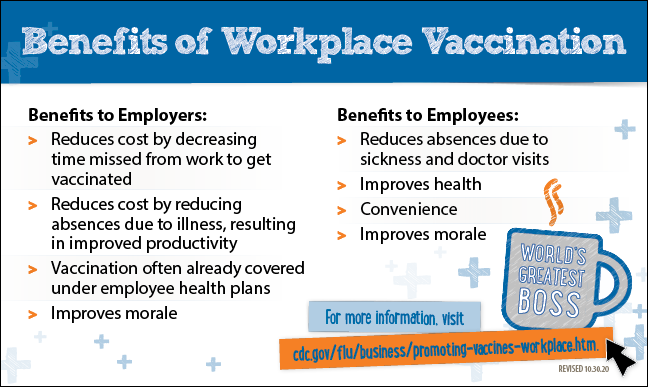With COVID-19 continuing to spread as we head into flu season, it’s critical to prevent the spread of germs and illness everywhere we go. That means at home, the grocery store, school and even our place of employment. Because many of us spend thirty plus hours a week at our workplace — be it an office building, sales floor, hospital or warehouse — it’s important that we all stay mindful of our own wellbeing and the health of our employees and co-workers.
As West Virginians prepare for the coming flu season during the COVID-19 pandemic, it’s vital that this encouragement extends to West Virginia business owners, who are able to make a positive impact and healthier workspace for employees by promoting flu vaccination to their employees.
Encouraging healthy habits and preventative measures such as a seasonal flu vaccination are just a few ways that employers can protect themselves and their employees from the flu.
Below are five reasons to promote flu vaccination in the workplace this season.
1. Prevent additional workplace disruptions.
 COVID-19 has caused a great amount of disruptions to small businesses and workplaces in West Virginia and many businesses are still trying to recover from those disruptions. In a typical flu season, the flu can have a major impact on business operations. Symptoms of the flu can last from a few days to two weeks, and longer for those who develop complications (such as pneumonia) from the flu. If the flu were to spread among staff, a great amount of employee absenteeism could be difficult for a small business to manage. Flu vaccination of employees, however, can help to prevent the flu and reduce the duration of the illness.
COVID-19 has caused a great amount of disruptions to small businesses and workplaces in West Virginia and many businesses are still trying to recover from those disruptions. In a typical flu season, the flu can have a major impact on business operations. Symptoms of the flu can last from a few days to two weeks, and longer for those who develop complications (such as pneumonia) from the flu. If the flu were to spread among staff, a great amount of employee absenteeism could be difficult for a small business to manage. Flu vaccination of employees, however, can help to prevent the flu and reduce the duration of the illness.
2. Flu symptoms are similar to COVID-19 symptoms.
With flu season coinciding with the COVID-19 pandemic, determining the ailment can be difficult to distinguish as the two bring about similar symptoms. An individual with fever, cough, chills, body aches, runny nose, and/or headache won’t know if they have the flu, COVID-19 or another illness unless they are tested. After being tested, the individual would likely have to quarantine until COVID-19 is ruled out. This could cause a great deal of missed work during flu season. If several employees are required to quarantine simultaneously, this can certainly hinder business operations. Promoting flu vaccination can at least keep one of these illnesses at bay and provide community immunity within the workplace, keeping those with weak immune systems safe.
3. Essential workers should be vaccinated.
The CDC recommends annual flu vaccination for everyone six months of age and older, with rare exceptions. However, flu vaccination is especially important for essential workers this year. Essential workers include: healthcare personnel working in nursing homes, long-term care facilities and pharmacy staff, and other critical infrastructure workforce. Folks who work directly with the public are also encouraged to have the flu vaccination.
Since the beginning of the pandemic, food and agriculture workers have been hit the hardest with reported COVID-19 cases. Businesses in these sectors should strongly encourage, and offer, flu vaccination to their employees this season.
4. Keep the workplace safe.
Business owners and managers should reevaluate their employee sick leave plans and protocol. With both the flu and COVID-19 circulating this year, a plan should be in place for what an employee should do if they test positive for either illness. It’s best to develop and review sick leave policies that encourage sick workers to stay at home without fear of any reprisals. By encouraging sick employees to stay home, business owners are preventing the spread of illness to other employees and customers. It’s recommended to advise all employees to stay home if they are sick until at least twenty-four hours after their fever* (temperature of 100 degrees Fahrenheit or 37.8 degrees Celsius or higher) is gone without the use of fever-reducing medicines. CDC guidance for business owners on strategies to prevent the spread of flu in the workplace can be found here.
Business owners can use signage to promote flu vaccination in high-traffic areas and utilize company communications such as newsletters, emails and more to share flu vaccination information with employees. Click here to download our #EveryOneAddsUp flu vaccination posters and graphics.
5. Vaccination is simple.
Luckily, most insurance plans are required to cover recommended vaccines without charge. That means most individuals can usually get vaccines at no cost. But you can make it even more simple for your employees to get vaccinated by hosting a pop-up vaccination clinic. Many pharmacies and local health departments are willing to conduct flu vaccination clinics at businesses, so reach out to your local pharmacy or health department to see if they are able to hold one for your employees.
If you’re a small business owner and don’t provide your employees with health coverage there are other options out there. For adults who do not have insurance or whose health insurance doesn’t cover flu vaccine, free flu vaccine is available at community health centers and local health departments.
Getting the flu vaccination is more important than ever this year. Those in a leadership position should encourage and educate workers and staff on the importance of the vaccination specifically during the COVID-19 pandemic. Check out VaccineFinder to find clinics and pharmacies in your area that offer flu vaccine.
Business owners and employees will certainly see effects if an outbreak of either flu or COVID-19 were to erupt at the workplace. Whether a big or small business, flu can be a big disruption for all.
Remember, you work together – so why not keep yourself, staff, coworkers and families safe this flu season?

